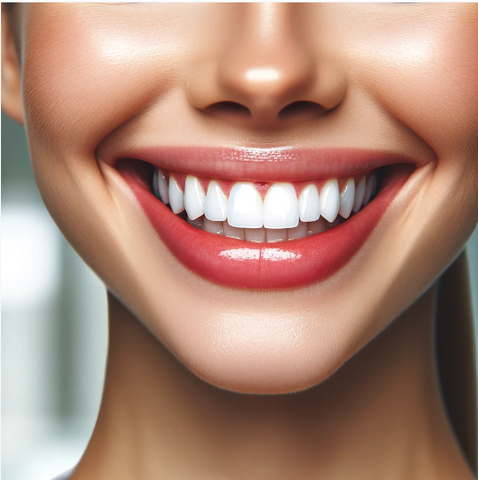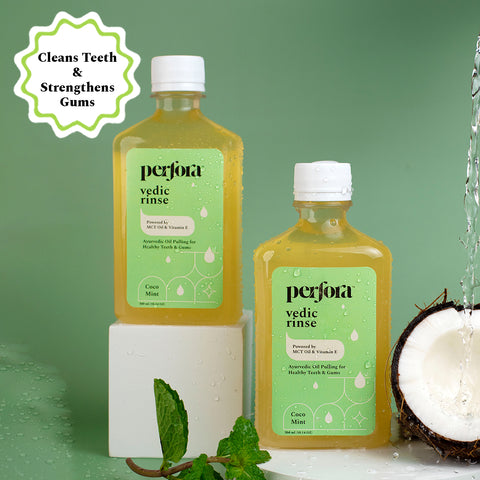Have you ever wondered how to keep your mouth healthy and fresh without using harsh chemicals or artificial ingredients? Do you want to improve your oral hygiene and prevent dental problems naturally? If yes, then you might want to try oil pulling, an ancient Ayurvedic practice that has been proven to have many benefits for your teeth and gums.
In this blog, we will explore what oil pulling is, how it works, and what are the advantages of oil pulling for your oral health. We will also discuss how oil pulling can help you manage tooth decay, soothe dental pain, and enhance your overall well-being. By the end of this blog, you will learn how to do oil pulling correctly and safely, and what are the best oils to use for this purpose.
What is Oil Pulling?
Oil pulling or oil gargling is a simple and effective technique that involves swishing a tablespoon of oil in your mouth for about 15 to 20 minutes, preferably in the morning before eating or drinking anything. The oil acts as a natural cleanser and detoxifier, removing bacteria, plaque, toxins, and other impurities from your mouth. The oil also lubricates and nourishes your gums, teeth, and tongue, improving their appearance and function.
Oil pulling is not a new fad or a gimmick. It is a traditional practice that has been used for thousands of years in Ayurveda, the ancient system of medicine and healing from India. Ayurveda considers oil pulling as a form of oral hygiene and a way of balancing the doshas, or the energies that govern your body and mind. According to Ayurveda, oil pulling can help you achieve harmony and health in your physical, mental, and emotional aspects.
The Many Advantages of Oil Pulling
Oil pulling is not only beneficial for your mouth, but also for your whole body. Here are some of the advantages of oil pulling that you can enjoy:
- Oil pulling benefits your teeth and gums. Oil pulling can reduce the amount of harmful bacteria in your mouth, such as Streptococcus mutans, which causes tooth decay and cavities. Oil pulling can also prevent the formation of plaque and tartar, which can lead to gum disease and gingivitis. Oil pulling can also strengthen your enamel, the protective layer of your teeth, and prevent tooth sensitivity and erosion. Oil pulling can also whiten your teeth naturally, by removing stains and discoloration.
- Oil gargling benefits your breath. Oil pulling can eliminate bad breath, or halitosis, by removing the odour-causing bacteria and toxins from your mouth. Oil pulling can also freshen your breath by improving your saliva production and pH balance, which can prevent dry mouth and acidic conditions. Oil pulling can also enhance your sense of taste and smell, by clearing your tongue and nasal passages.
- Oil pulling benefits your immune system. Oil pulling can boost your immunity, by reducing the inflammation and infection in your mouth, which can affect your overall health. Oil pulling can also help you fight off common colds, flu, and other illnesses, by stimulating your lymphatic system and enhancing your body’s natural defence mechanisms. Oil pulling can also detoxify your blood and organs, by removing the toxins that enter your body through your mouth.
These are just some of the many advantages of oil pulling that you can experience. Oil pulling can also improve your digestion, metabolism, hormonal balance, mood, energy, and more. Oil pulling is truly a holistic practice that can benefit your entire body and mind.

The Role of Oil Pulling in Managing Tooth Decay
One of the most common and serious dental problems that many people face is tooth decay, or the destruction of the hard tissues of your teeth. Tooth decay can cause pain, sensitivity, infection, and tooth loss, affecting your oral function and appearance. Tooth decay can also affect your overall health, by increasing your risk of diabetes, heart disease, stroke, and other chronic diseases.
To prevent and manage tooth decay, you need to maintain good oral hygiene and visit your dentist regularly. You also need to limit your intake of sugary and acidic foods and drinks, and choose healthy and nutritious options instead. You can also use oil pulling as a natural and effective way of preventing and managing tooth decay.
Here’s how oil pulling for tooth decay works:
- Reducing the amount of bacteria and acid in your mouth. Oil pulling can kill or inhibit the growth of Streptococcus mutans and other bacteria that cause tooth decay. Oil pulling can also neutralise the acid in your mouth, by increasing your saliva production and pH level.
- Removing the plaque and food debris from your teeth. Oil pulling can act as a mechanical cleanser, by dislodging and removing the plaque and food particles that stick to your teeth and interdental spaces. This can prevent the accumulation of bacteria and acid that can damage your teeth.
- Strengthening and remineralizing your teeth. Oil pulling can provide essential minerals and nutrients to your teeth, such as calcium, phosphorus, magnesium, and vitamin D, which can help rebuild and repair your enamel and dentin.

Soothing Dental Pain with Oil Pulling
Another common and unpleasant dental problem that many people experience is dental pain, or the sensation of discomfort or distress in your teeth, gums, or jaw. Dental pain can have various causes, such as tooth decay, infection, injury, gum disease, tooth grinding, sinusitis, or temporomandibular joint disorder (TMJ). Dental pain can affect your quality of life, by interfering with your eating, speaking, sleeping, and daily activities.
To relieve and manage dental pain, you need to consult your dentist and get the proper diagnosis and treatment. You also need to take care of your oral hygiene and avoid triggers that can worsen your pain, such as hot, cold, sweet, or acidic foods and drinks. You can also use oil pulling as a natural and effective way of soothing dental pain.
Oil pulling can help you soothe dental pain by:
- Reducing the inflammation and infection in your mouth. Oil pulling can lower the levels of pro-inflammatory cytokines, or the molecules that cause inflammation, in your saliva and blood. Oil pulling can also fight against the bacteria, viruses, fungi, and parasites that can cause infection and pain in your mouth.
- Relaxing your muscles and nerves in your jaw and face. Oil pulling can act as a massage therapy, by relaxing and stretching your muscles and nerves that control your jaw and facial movements. Oil pulling can also reduce your stress and anxiety, by activating your parasympathetic nervous system, or the part of your nervous system that calms you down.
- Providing analgesic and anti-inflammatory properties. Oil pulling can offer pain relief and anti-inflammatory effects, by using oils that contain natural compounds that can modulate your pain receptors and inflammatory pathways.
Ayurvedic Perspective: Benefits of Oil Pulling
Oil pulling is not only a scientific and evidence-based practice, but also a spiritual and holistic one. Oil pulling is rooted in Ayurveda, the ancient system of medicine and healing from India, which considers oil pulling as a form of oral hygiene and a way of balancing the doshas, or the energies that govern your body and mind.
According to Ayurveda, there are three doshas: vata, pitta, and kapha, which correspond to the elements of air, fire, and water, respectively. Each person has a unique constitution, or prakriti, which is determined by the combination and proportion of the doshas in their body and mind. The doshas can influence your physical, mental, and emotional characteristics, such as your body type, personality, preferences, strengths, and weaknesses.
The doshas can also affect your health and well-being, by determining your susceptibility and resistance to diseases and disorders. The doshas can become imbalanced, or vikriti, due to various factors, such as diet, lifestyle, environment, stress, and emotions. The imbalance of the doshas can cause disharmony and disease in your body and mind, and manifest as various symptoms and signs.
To restore and maintain the balance of the doshas, and thus achieve health and harmony, Ayurveda prescribes various therapies and practices, such as diet, herbs, yoga, meditation, massage, and oil pulling. Here are some of the benefits of oil pulling according to Ayurveda:
- Balancing vata. Vata is the dosha that governs movement, creativity, and communication. Vata is responsible for your breathing, circulation, nerve impulses, and speech. Vata can become imbalanced due to cold, dry, windy, or erratic conditions, and cause symptoms such as dryness, cracking, pain, sensitivity, anxiety, and insomnia. Oil pulling can balance vata, by lubricating, warming, and soothing your mouth, throat, and nervous system.
- Balancing pitta. Pitta is the dosha that governs transformation, intelligence, and passion. Pitta is responsible for your digestion, metabolism, vision, and intellect. Pitta can become imbalanced due to hot, spicy, sour, or acidic conditions, and cause symptoms such as inflammation, infection, bleeding, sensitivity, anger, and jealousy. Oil pulling can balance pitta, by cooling, cleansing, and detoxifying your mouth, blood, and liver.
- Balancing kapha. Kapha is the dosha that governs stability, structure, and compassion. Kapha is responsible for your immunity, growth, lubrication, and emotions. Kapha can become imbalanced due to damp, heavy, sticky, or sweet conditions, and cause symptoms such as congestion, mucus, plaque, tartar, lethargy, and attachment. Oil pulling can balance kapha, by stimulating, drying, and lightening your mouth, lungs, and lymphatic system.
Oil pulling can help you balance the doshas, and thus connect your traditional practices with your contemporary health habits. Oil pulling can also help you achieve harmony and health in your physical, mental, and emotional aspects.

Takeaway Tips
Oil pulling is a simple and effective technique that can benefit your oral health and overall well-being. Oil pulling can prevent and manage tooth decay, soothe dental pain, and balance the doshas, among other advantages. Oil pulling is a natural and safe practice, but you need to follow some guidelines and precautions to do it correctly and safely. Here are some takeaway tips for oil pulling:
- Choose the right oil. You can use any edible oil for oil pulling, but some oils may have more benefits than others, depending on your dosha, condition, and preference, like the perfora’s coco mint oil. You can also use oils that are organic, cold-pressed, and unrefined, to ensure their quality and purity. You can also add some essential oils, such as clove, peppermint, or tea tree, to enhance the flavour and effects of oil pulling. To learn more about how to choose the best oil, head over to our blog on best oil for oil pulling.
- Do it at the right time. The best time to do oil pulling is in the morning, before eating or drinking anything, as this is when your mouth is most loaded with bacteria and toxins. You can also do oil pulling at any other time of the day, as long as you have an empty stomach, or at least three hours after a meal.
- Do it for the right duration. The ideal duration for oil pulling is about 15 to 20 minutes, as this is enough time to swish the oil around your mouth and draw out the impurities.
- Do it with the right technique. The proper technique for oil pulling is to take a tablespoon of oil in your mouth and swish it gently and slowly, without gargling, swallowing, or spitting. You should also move the oil around your mouth, between your teeth, and over your tongue, to reach all the areas and surfaces.
- Do it with the right disposal. The final step of oil pulling is to spit out the oil in a trash can or a tissue, and not in the sink or the toilet, as this can clog the pipes and cause plumbing problems. You should also rinse your mouth thoroughly with warm water, and optionally with salt or baking.
Frequently Asked Questions on Oil pulling benefits
Q) Is it good to do oil pulling everyday?
Yes, it is good to do oil pulling everyday, as it can help you maintain your oral hygiene and prevent dental problems. Oil pulling can also improve your overall health, by removing toxins and balancing the doshas. However, you should not use oil pulling as a substitute for regular dental care, such as brushing, flossing, and visiting your dentist.
Q) Do I brush after oil pulling?
Yes, you should brush your teeth after oil pulling, as it can help you remove any remaining oil or debris from your mouth. You should also rinse your mouth with water, and optionally with salt or baking soda, to neutralise the pH and freshen your breath. You can also use a tongue scraper to clean your tongue and enhance your taste buds.
Q) How many minutes should you oil pull?
The ideal duration for oil pulling is about 15 to 20 minutes, as this is enough time to swish the oil around your mouth and draw out the impurities. However, you can start with a shorter duration, such as 5 to 10 minutes, and gradually increase it as you get used to oil pulling.






